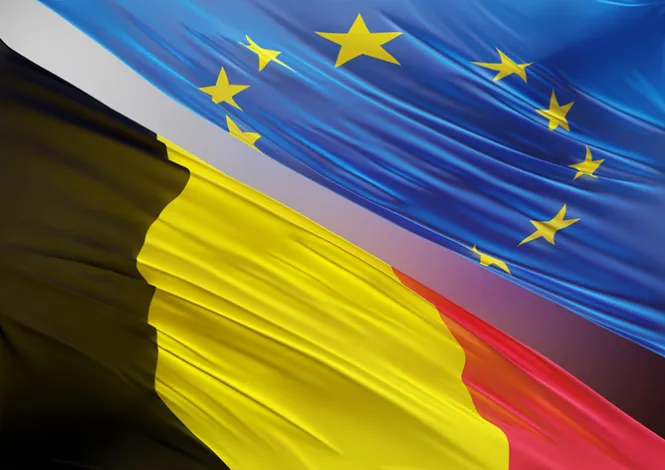
On 1 January 2024, Belgium took over the rotating presidency of the Council of the European Union (EU) from Spain. Belgium’s 13th such presidency, the last one being in 2010, arrives at a turbulent moment as the EU grapples with multiple crises including the ongoing Russia-Ukraine war, dire instability in the Middle East, energy security, and the China challenge.
The Council’s six-month rotating presidencies work in an 18-month trio format to maintain agenda continuity, progress on various EU legislation, and seek collaboration and consensus between member states—all while incorporating the incumbent country’s own vision and priorities at the EU level. With the current trio consisting of Spain, Belgium, and Hungary, Belgium will preside until the end of June and then hand over the presidency in July to Hungary and its eurosceptic leadership, notorious for playing spoiler in EU decision-making.
By the end of February 2024, the EU will enter campaign mode for its elections in June which will lead to the formation of a new European Parliament and Commission. This provides Belgium with a much shorter period than regular presidencies to conclude pending files or tackle new ones and deliver for the EU’s 450 million citizens.
With the current trio consisting of Spain, Belgium, and Hungary, Belgium will preside until the end of June and then hand over the presidency in July to Hungary and its eurosceptic leadership, notorious for playing spoiler in EU decision-making.
Upcoming national and regional Belgian elections in June 2024 may further complicate the presidency’s ambitions given the challenges of Belgium’s fragmented political system, which holds the Guinness world record for staying the longest period without government. After the collapse of the government of former Belgian Prime Minister Charles Michel—the current president of the European Council since 2019—in 2018, it took almost 600 days for the current seven-party coalition to take shape, through which Belgium broke its own previous record of 541 days without a government after the 2010 elections.
Yet as the country that hosts the EU and NATO institutions with Brussels known as the de facto capital and headquarters of the EU, Belgium has been instrumental in the EU’s evolution and played a central role in the European project. In 1958, Belgium was the first country to lead the European Economic Community (EEC), the six-member precursor to the EU. As Prime Minister Alexander De Croo reiterates, “Belgians have the EU in our DNA”, and Foreign Minister Hadja Lahbib attests to the “compromis à la belge”—the ability of Belgians to compromise as a small multilingual multiethnic nation.
Priorities for the Belgian presidency
In line with its motto “Protect, Strengthen, Prepare”, Belgium has identified six priority areas for its presidency.
The first includes defending the rule of law, democracy and unity, accompanied by a focus on EU enlargement and support for candidate countries while preparing the Union for future accessions. This has gained greater salience given the decision at the recent EU summit in December to open accession negotiations with Ukraine and Moldova and in the context of the 20th anniversary of the EU’s huge eastward enlargement coinciding with the Belgian presidency.
The deal aims to tackle the longstanding hot-button issue of migration through asylum system reforms and effective migration management in line with EU values.
The second priority is to strengthen European competitiveness, industrial policies and the continent’s economic security by enhancing the EU’s internal market, simplifying regulatory frameworks, reducing critical dependencies, and creating a resilient digital ecosystem.
The third involves pursuing a green and just energy and climate transition in line with the EU’s Green Deal. This also includes augmenting the EU’s circular economy, delivering affordable energy to the population, advancing renewable and low-carbon energy sources, and reaching a consensus on carbon emissions from buses and trucks.
Belgium’s fourth priority is the promotion of Europe’s social agenda to facilitate a more inclusive and fair European society, plus strengthening the Union’s health agenda through improving crisis preparedness and ensuring equitable access to quality healthcare.
Another top priority is to protect people and borders in sync with the EU’s new deal on migration and asylum agreed upon in December. The deal aims to tackle the longstanding hot-button issue of migration through asylum system reforms and effective migration management in line with EU values. Belgium will also prioritise combating organised crime and tackling terrorism and extremism.
The last priority involves working towards a global Europe including strengthening the Union’s autonomy and resilience in the wake of increasing geopolitical contestations through more ambitious trade policies and greater mobilisation of security, defence, and development capabilities.
The presidency will also aim to move forward on the EU’s landmark agreement to regulate Artificial Intelligence (AI) in the world’s first-of-its-kind effort.
In addition to these, a special summit is already scheduled for the beginning of February where the focus will include passing the €50-aid package for Ukraine that Hungary vetoed during the December 2023 Council summit. The EU’s Multi-Annual Financial Framework (MFF), aka the Union’s long-term budget, will also be under review. The presidency will also aim to move forward on the EU’s landmark agreement to regulate Artificial Intelligence (AI) in the world’s first-of-its-kind effort.
With its ambitious presidency agenda, short time span, and multiple elections looming, Belgium is likely to have an exhilarating few months ahead.
Shairee Malhotra is an Associate Fellow at the Observer Research Foundation
The views expressed above belong to the author(s). ORF research and analyses now available on Telegram! Click here to access our curated content — blogs, longforms and interviews.




 PREV
PREV


